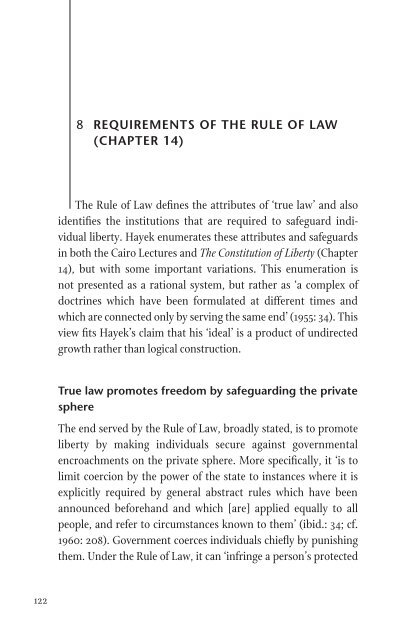Hayek's The Constitution of Liberty - Institute of Economic Affairs
Hayek's The Constitution of Liberty - Institute of Economic Affairs
Hayek's The Constitution of Liberty - Institute of Economic Affairs
You also want an ePaper? Increase the reach of your titles
YUMPU automatically turns print PDFs into web optimized ePapers that Google loves.
e q u i r e m e n t s o f t h e r u l e o f l aw<br />
8 REQUIREMENTS OF THE RULE OF LAW<br />
(Chapter 14)<br />
<strong>The</strong> Rule <strong>of</strong> Law defines the attributes <strong>of</strong> ‘true law’ and also<br />
identifies the institutions that are required to safeguard individual<br />
liberty. Hayek enumerates these attributes and safeguards<br />
in both the Cairo Lectures and <strong>The</strong> <strong>Constitution</strong> <strong>of</strong> <strong>Liberty</strong> (Chapter<br />
14), but with some important variations. This enumeration is<br />
not presented as a rational system, but rather as ‘a complex <strong>of</strong><br />
doctrines which have been formulated at different times and<br />
which are connected only by serving the same end’ (1955: 34). This<br />
view fits Hayek’s claim that his ‘ideal’ is a product <strong>of</strong> undirected<br />
growth rather than logical construction.<br />
True law promotes freedom by safeguarding the private<br />
sphere<br />
<strong>The</strong> end served by the Rule <strong>of</strong> Law, broadly stated, is to promote<br />
liberty by making individuals secure against governmental<br />
encroachments on the private sphere. More specifically, it ‘is to<br />
limit coercion by the power <strong>of</strong> the state to instances where it is<br />
explicitly required by general abstract rules which have been<br />
announced beforehand and which [are] applied equally to all<br />
people, and refer to circumstances known to them’ (ibid.: 34; cf.<br />
1960: 208). Government coerces individuals chiefly by punishing<br />
them. Under the Rule <strong>of</strong> Law, it can ‘infringe a person’s protected<br />
private sphere only as punishment for breaking an announced<br />
general rule’ (206). Here and elsewhere, Hayek distinguishes<br />
sharply between general laws that the ordinary citizen must<br />
observe and those acts <strong>of</strong> legislative authority, which amount to<br />
orders, that instruct servants <strong>of</strong> the state ‘concerning the manner<br />
in which they are to direct the apparatus <strong>of</strong> government and the<br />
means which are at their disposal’ (207). Government has broad<br />
discretion to command how its particular resources will be used,<br />
but it cannot order about the private individual as if he were a<br />
mere governmental resource.<br />
True law is known and certain<br />
<strong>The</strong> laws must be made known or promulgated, since they shape<br />
the environment in which we plan our actions. If individuals<br />
know what rules they can count on, they are better able to predict<br />
the outcome <strong>of</strong> their actions, determine their responsibilities, and<br />
use their knowledge effectively. Known and certain laws are vital<br />
to economic life; and they promote the spontaneous growth <strong>of</strong><br />
social order. <strong>The</strong>y enable people to ‘foresee with a high degree <strong>of</strong><br />
confidence what collaboration they can expect from others,’ thus<br />
facilitating the ‘mutual adjustment <strong>of</strong> individuals’ that produces<br />
order spontaneously. Hayek emphasises that the law’s relative<br />
certainty makes court decisions predictable, thus reducing litigation<br />
and enabling a free society to run more smoothly and efficiently.<br />
<strong>The</strong>se considerations lead him to conclude that ‘the task<br />
<strong>of</strong> the lawgiver is not to set up a particular order but merely to<br />
create conditions in which an orderly arrangement can establish<br />
and ever renew itself’ (208–9; cf. 159–61).<br />
122<br />
123












